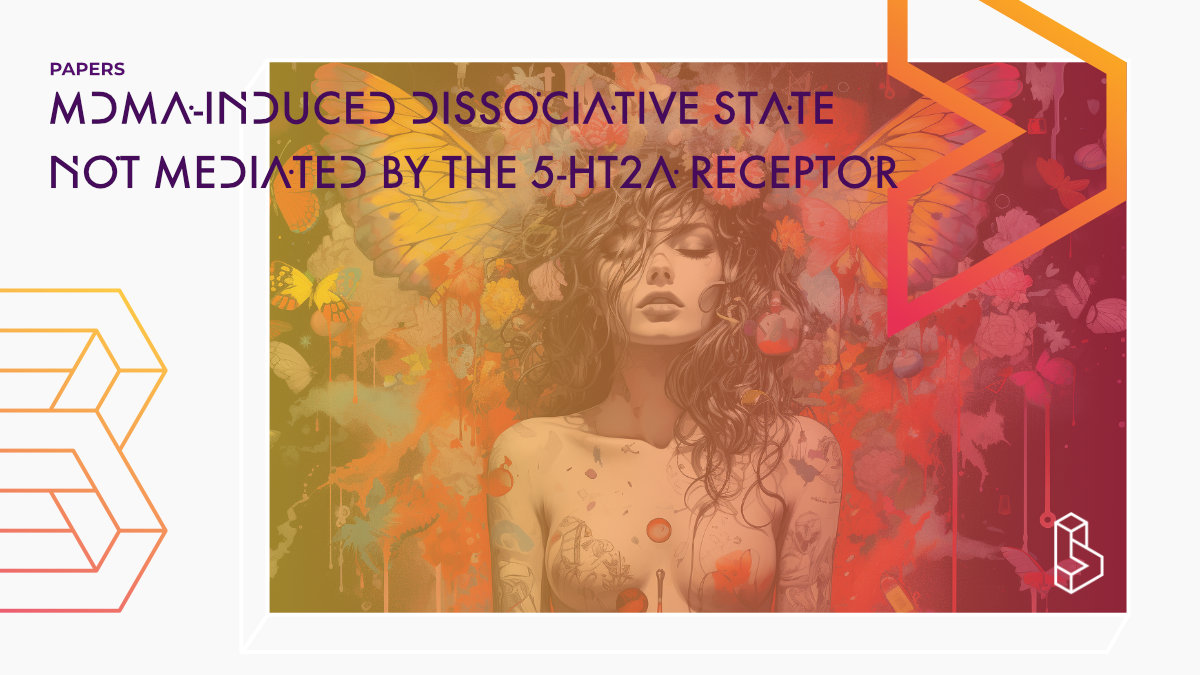This placebo-controlled study (n=20) found that the 5-HT2A receptor does not mediate the dissociative effects of MDMA (75mg) nor correlate with cortisol levels or MDMA blood concentrations. A correlation with heart rate was observed but didn’t appear causally linked to the dissociative effects.
Abstract of MDMA-Induced Dissociative State not Mediated by the 5-HT2A Receptor
“Previous research has shown that a single dose of MDMA induce a dissociative state, by elevating feelings of depersonalization and derealization. Typically, it is assumed that action on the 5-HT2A receptor is the mechanism underlying these psychedelic experiences. In addition, other studies have shown associations between dissociative states and biological parameters (heart rate, cortisol), which are elevated by MDMA. In order to investigate the role of the 5-HT2 receptor in the MDMA-induced dissociative state and the association with biological parameters, a placebo-controlled within-subject study was conducted including a single oral dose of MDMA (75 mg), combined with placebo or a single oral dose of the 5-HT2 receptor blocker ketanserin (40 mg). Twenty healthy recreational MDMA users filled out a dissociative states scale (CADSS) 90 min after treatments, which was preceded and followed by assessment of a number of biological parameters (cortisol levels, heart rate, MDMA blood concentrations). Findings showed that MDMA induced a dissociative state but this effect was not counteracted by pre-treatment with ketanserin. Heart rate was the only biological parameter that correlated with the MDMA-induced dissociative state, but an absence of correlation between these measures when participants were pretreated with ketanserin suggests an absence of directional effects of heart rate on dissociative state. It is suggested that the 5-HT2 receptor does not mediate the dissociative effects caused by a single dose of MDMA. Further research is needed to determine the exact neurobiology underlying this effect and whether these effects contribute to the therapeutic potential of MDMA.”
Authors: Drew J. Puxty, Johannes G. Ramaekers, Rafael de la Torre, Magí Farré, Neus Pizarro, Mitona Pujadas & Kim P. C. Kuypers
Summary of MDMA-Induced Dissociative State not Mediated by the 5-HT2A Receptor
Classical psychedelics like LSD, DMT and psilocybin are known for their mind-altering and dissociative states, and MDMA can also induce a dissociative state. This dissociative state can be milder than the one induced by psilocybin or ketamine, and is experienced as non-problematic by the psychedelic user.
Studies have demonstrated that the serotonin 2A (5-HT2 A) receptor mediates MDMA-induced alterations in mood and perception, and that the 5-HT2 receptor could play a role in the MDMA-induced dissociative symptoms.
Find this paper
MDMA-Induced Dissociative State not Mediated by the 5-HT2A Receptor
https://doi.org/10.3389/fphar.2017.00455
Open Access | Google Scholar | Backup | 🕊
Cite this paper (APA)
Puxty, D. J., Ramaekers, J. G., De la Torre, R., Farré, M., Pizarro, N., Pujadas, M., & Kuypers, K. P. (2017). MDMA-induced dissociative state not mediated by the 5-HT2A receptor. Frontiers in Pharmacology, 8, 455.
Study details
Compounds studied
MDMA
Topics studied
Neuroscience
Study characteristics
Original
Placebo-Controlled
Double-Blind
Within-Subject
Randomized
Participants
20
Humans
Authors
Authors associated with this publication with profiles on Blossom
Kim KuypersKim Kuypers is a researcher at Maastricht University. Her work is concerned with understanding the neurobiology underlying flexible cognition, empathy, and well-being. One of the main ways she does is with the use of psychedelics.
Johannes Ramaekers
Johannes Ramaekers is a professor at Maastricht University his work focuses on behavioral toxicology of drugs and combines methods from psychopharmacology, forensic toxicology and neuroscience to determine drug-induced changes in human performance. Some of this research is done with DMT.
Institutes
Institutes associated with this publication
Maastricht UniversityMaastricht University is host to the psychopharmacology department (Psychopharmacology in Maastricht) where various researchers are investigating the effects of psychedelics.
Compound Details
The psychedelics given at which dose and how many times
MDMA 75 mg | 2xLinked Research Papers
Notable research papers that build on or are influenced by this paper
MDMA-induced indifference to negative sounds is mediated by the 5-HT2A receptorThis placebo-controlled study (n=20) found that individuals under the acute influence of MDMA (75mg) were less sensitive to negative sounds. The authors also found evidence that this may be related to the 5-HT2A receptor.

